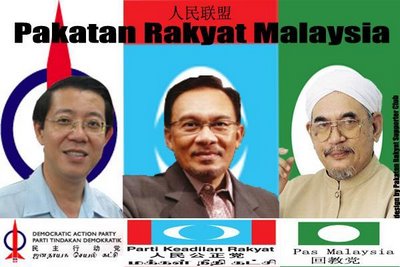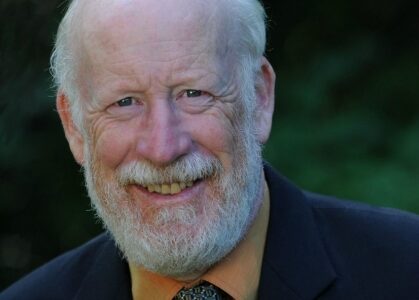Towards a 'Colored Revolution' in Malaysia? US and Pro-Israel Foundations Channel Support to Pakatan Rakyat Opposition
As Malaysia approaches its highly anticipated 13th General Elections set to take place at some point before late June 2013, a tense political climate and a sense of unpredictability looms over the nation. The significance of these upcoming elections cannot be understated. During Malaysia’s 2008 General Elections, the ruling Barisan Nasional coalition, which held power continuously since the nation’s independence, experienced its worst result in decades, while the opposition Pakatan Rakyat coalition led by Anwar Ibrahim won 82 parliamentary seats. For the first time, the ruling party was deprived of its two-thirds parliamentary majority, which is required to pass amendments to Malaysia’s Federal Constitution. As the United States continues to militarily increase its presence in the Pacific region inline with its strategic policy shift to East Asia, Washington’s leaders would like to see compliant heads of state who will act to further American interests in the ASEAN region.
The outcome of the approaching elections could have significant ramifications for Malaysia’s foreign policy, economy, and trade relations. While allegations of corruption and economic mismanagement hinder the credibility of ruling Prime Minister Najib Razak, foreign organizations affiliated with the American Israel Public Affairs Committee (AIPAC) and funded by the United States government, have contributed support toward bolstering the influence and status of the Malaysia’s opposition groups, in addition to the controversial Bersih coalition for electoral reform, led by Ambiga Sreenevasan. Opponents of this information may dismiss these claims as the “propaganda” of Barisan Nasional, however the validity of these accusations have been highly documented, and constitute an attempt by foreign governments to undermine Malaysia’s independent political process. On June 27th, 2011, Bersih coalition leader Ambiga Sreenevasan conceded that her organization received financial assistance from two private American organizations:
Ambiga admitted to Bersih receiving some money from two US organisations — the National Democratic Institute (NDI) and Open Society Institute (OSI) — for other projects, which she stressed were unrelated to the July 9 march. [1]
However innocuous such contributions may seem, a more critical review of these organizations and their affiliations is necessary. Hungarian-American philanthropist and financier George Soros founded the Open Society Institute in 1993, whose principle aim sought to “strengthen open society principles and practices against authoritarian regimes and the negative consequences of globalization,” with an emphasis on countries in transition from communism after the fall of the Soviet Union. [2] Although OSI has emphasized its commitment to “human rights” and “transparency” by heavily sponsoring organizations such as Amnesty International and Human Rights Watch, Soros was convicted of insider trading in 2002 regarding French bank Société Générale and was ironically denied an appeal by the “European Court of Human Rights.” [3][4][5] Although Soros has appeared to be publicly critical of capitalism, he has disingenuously profited from predatory trading in many instances, most prominently in 1992 when he earned an estimated $1.1 billion by short selling sterling while the British government was reluctant to adjust its interest rates prior to devaluing the pound.
Former US Secretary of State Madeline Albright chairs the National Democratic Institute, an organization that supplies electoral observers and promotes governance reform, widely seen as an attempt to foster foreign political systems compatible with American interests by assisting civil society groups in mounting pressure on national governments. NDI President Kenneth Wollack served as the legislative director of the American Israel Public Affairs Committee, widely considered to be Israel’s most prominent lobbyist organization, one that influences American legislation to exert aggressive Israeli policy and viewpoints. [6] The National Democratic Institute is one of four organizations funded by the National Endowment for Democracy (NED), in addition to the International Republican Institute (IRI), the Chamber of Commerce’s Center for Private Enterprise (CIPE) and the American Center for International Labor Solidarity.
Alan Weinstein, one of the founders of the National Endowment for Democracy was notably quoted in 1991 as saying, “A lot of what we (NED) do was done 25 years ago covertly by the CIA.” [7] The National Endowment for Democracy receives its funding entirely through an annual allocation of funds from the United States Congress within the budget of the development assistance agency USAID, a branch of the US State Department. [8] Although the NED receives public funding from the US taxpayer, the activities of its four satellite institutes are not reported to Congress, making funding trails and their final recipients difficult to identify. Although the organization boasts of “promoting democracy” and “fortifying civil society” around the world, history had proven that these tired euphemisms have been used in numerous countries to mask funding to various political forces opposed to their national governments and aligned with American interests. American historian and former employee of the US State Department William Blum writes:
NED’s Statement of Principles and Objectives, adopted in 1984, asserts that “No Endowment funds may be used to finance the campaigns of candidates for public office.” But the ways to circumvent the spirit of such a prohibition are not difficult to come up with; as with American elections, there’s “hard money” and there’s “soft money”. As described in the “Elections” and “Interventions” chapters, NED successfully manipulated elections in Nicaragua in 1990 and Mongolia in 1996; helped to overthrow democratically elected governments in Bulgaria in 1990 and Albania in 1991 and 1992; and worked to defeat the candidate for prime minister of Slovakia in 2002 who was out of favor in Washington. And from 1999 to 2004, NED heavily funded members of the opposition to President Hugo Chavez in Venezuela to subvert his rule and to support a referendum to unseat him. [9]
NED President Carl Gershman was formerly a member of the Governing Council of the American Jewish Congress and Vice-Chairman of the Young People’s Socialist League, and in 1968, he was employed in the research department of the Anti-Defamation League of B’nai B’rith, considered the most prominent Jewish service organization in the world, committed to the security and continuity the State of Israel. [10] The Anti-Defamation League is a US-based human rights group committed to the “security of Israel and Jews worldwide,” and was implicated in 1993 by the District of Attorney of San Francisco for overseeing a vast surveillance operation monitoring American citizens who were opposed to Israel’s policies in the occupied West Bank and Gaza, prior to passing their personal information to the Israeli government in Tel Aviv. [11]
In addition to providing funding to the Bersih coalition through the National Democratic Institute, the National Endowment for Democracy’s Malaysian operation provides $100,000 (RM 317,260) for political news website Malaysiakini, considered to be the nation’s most pro-opposition news outlet. [12] Premesh Chandran, Malaysiakini CEO, is a grantee of the Open Society Foundations and launched the news organization with a $100,000 grant from the Bangkok-based Southeast Asian Press Alliance (SEAPA), a recipient of funds from the Open Society Institute, the NED, and Freedom House, an organization reliant on US federal government grants for a significant percentage of its funding. [13][14] NED also provides $90,000 (RM 285,516) to SUARAM, an organization promoting human rights. [15]
The most significant recipient of NED’s Malaysia programs is the International Republican Institute (IRI), who annually receives $802,122 (RM 2,544,670) and is tasked to “work with state leaders in Penang and Selangor to provide them with public opinion research, training and other resources to enable them to be more effective representatives of their constituents.” [16] IRI’s mention of these specific regions is unsurprising, as Penang is held by the Malaysian Democratic Action Party, while Selangor is held by Parti Keadilan Rakyat, two of the three organizations comprising the opposition coalition Pakatan Rakyat, led by Anwar Ibrahim. US Senator John McCain, an ardent supporter of American militarism who boasts of being “proudly pro-American and proudly pro-Israel”, chairs the International Republican Institute, whose mission statement in Malaysia reads:
Since Malaysia’s independence in 1957, the country has experienced a series of national elections, but never a change in national government. The ruling coalition, known as Barisan Nasional (BN) since 1973, has held power continuously during Malaysia’s post-independence era. In the 2008 general elections, for the first time, the BN lost its two-thirds majority in parliament and control of five state assemblies to the opposition coalition, Pakatan Rakyat (PR). Subsequently, in April 2011 in Sarawak (the only state holding assembly elections before national elections occur) the BN retained control of the state assembly but suffered a reduction in its majority. It is in this context that IRI provides technical assistance, training, and consultation to political parties to build knowledge and impart skills that enable both ruling and opposition Malaysian political leaders to more effectively address citizen concerns. IRI’s current work in this area started in 2009 when the Institute began a groundbreaking series of training sessions designed to assist political parties in developing the in-house capacity to conduct and analyze focus group discussions. These sessions were followed by workshops which allowed focus group moderators to present their findings to their colleagues and craft messages that were used to recruit new political party members and retain existing ones. [17]
It comes as little surprise that opposition leader Anwar Ibrahim talks boldly of a “Malaysian Spring,” as the same organizations bolstering the opposition in Kuala Lumpur have successfully fomented events that led to the series of uprisings across the Arab World in 2011. Such organizations rely on the passive impressionability of their followers, while enflaming the legitimate grievances of the subject population to pressure a change in government. This is accomplished by the formation and propagation of dissident news media organizations, and by leveraging police misconduct and human rights abuses to discredit targeted governments in the eyes of the international community. Such agitation is not intended to promote a genuine democratic framework; its purpose is the gradual installation of national governments friendly to American interests by coaxing popular uprising and social unrest. In an April 2011 article published by the New York Times titled, “U.S. Groups Helped Nurture Arab Uprisings,” it was stated:
A number of the groups and individuals directly involved in the revolts and reforms sweeping the region, including the April 6 Youth Movement in Egypt, the Bahrain Center for Human Rights and grass-roots activists like Entsar Qadhi, a youth leader in Yemen, received training and financing from groups like the International Republican Institute, the National Democratic Institute and Freedom House, a nonprofit human rights organization based in Washington. The Republican and Democratic institutes are loosely affiliated with the Republican and Democratic Parties. They were created by Congress and are financed through the National Endowment for Democracy, which was set up in 1983 to channel grants for promoting democracy in developing nations. The National Endowment receives about $100 million annually from Congress. Freedom House also gets the bulk of its money from the American government, mainly from the State Department. [18]
In the Egyptian context, these organizations have experienced “blowback” from their activities training and funding dissidents, and fomenting Egypt’s popular revolution. In a December 2011 article published by the Los Angeles Times, it was said:
Egyptian security forces on Thursday raided the offices of 17 nongovernmental organizations, including three U.S.-based agencies, as part of a crackdown on foreign assistance that has drawn criticism from the West and threatened human rights groups and pro-democracy movements. The move appeared to be part of a strategy to intimidate international organizations. The ruling military council has repeatedly blamed “foreign hands” for exploiting Egypt’s political and economic turmoil. But activists said the army was using the ruse of foreign intervention to stoke nationalism and deflect criticism of abuses. Egyptian soldiers and black-clad police officers swept into offices, interrogated workers and seized computers across the country. Those targeted included U.S. groups the National Democratic Institute, the International Republican Institute and Freedom House, which are funded by Congress to monitor elections and promote democracy overseas. [19]
While the Los Angeles Times frames its report to insinuate that Egypt’s security forces have intrusively aimed to “intimidate” international human rights groups, one must examine the case of Egypt’s newly drafted constitution. After the overthrow of former Egyptian President Hosni Mubarak, democracy advocates called for the constitution to be rewritten from scratch. Reuters published reports citing a pro-opposition judiciary official, who said Egypt’s new constitution would be drafted by civil society groups, namely, the Arabic Network for Human Rights Information, a recipient of funds directly from George Soros’ Open Society Institute and the Egyptian Organization for Human Rights, financed by the National Endowment for Democracy. [20][21][22] Undoubtedly, the conduct of foreign nations and their relationship with opposition organizations and civil society groups is incompatible within any authentic democratic framework.
In the Malaysian context, opposition leader Anwar Ibrahim maintains close ties with senior US officials and organizations such as the National Endowment for Democracy. In July 2006, Ibrahim chaired the Washington-based Foundation for the Future, established and funded by the US Department of State at the behest of Elizabeth Cheney, the daughter of then-Vice President Dick Cheney, who was recently convicted in absentia for war crimes for his issuance of torture during the Iraq war by Kuala Lumpur War Crimes Commission, chaired by former Malaysian Prime Minister Mahathir Mohamed. [23] In 2007, Ibrahim was a panelist at the National Endowment for Democracy’s “Democracy Award” event held in Washington. [24] These questionable affiliations raise strong concerns over the legitimacy of the candidate and the administration he would lead if winning the 13th General Election.
It would be advisable for Malaysia to follow the example of Russia; President Vladimir Putin recently approved a new law that tightens controls on civil rights groups receiving funded from abroad, forcing non-governmental organizations (NGOs) engaging in “political activity” to register with the Russian Justice Ministry as “foreign agents,” requiring such organizations to file a report to officials every quarter. [25] While such a law would inevitably be criticized as a suppression of dissent, it must be understood that such legislation would not hamper legitimate activism. Malaysia, like Russia, must take the initiative to address the legitimate grievances of activists by bolstering its own indigenous institutions and civil society organizations. Foreign organizations with questionable affiliations attempting to tip the balance of power in their favor is the very antithesis of an authentic democracy. A quote from a recent Op-Ed penned by Russian journalist Veronika Krasheninnikova sends a strong message to the people of Malaysia:
Building a patriotic civil society cannot be outsourced. Democratic processes and national security cannot be outsourced – all the more so to openly hostile governments. [26]
Notes
[1] Bersih repudiates foreign Christian funding claim, The Malaysian Insider, July 27, 2011
[2] A Global Alliance for Open Society, Soros Foundation Network, 2001
[3] Report and financial statements for the year ended 31 March 2010, Amnesty International, March 31, 2010 (Page 10)
[4] Partners, Human Rights Watch, 2012
[5] Soros Loses Case Against French Insider-Trading Conviction, Bloomberg, October 6, 2011
[6] Kenneth Wollack, National Democratic Institute, 2011
[7] Democracy promotion: America’s new regime change formula, Russia Today, November 23, 2010
[8] History, National Endowment for Democracy, 2011
[9] Trojan Horse: The National Endowment for Democracy, The International Endowment for Democracy, 2003
[10] Who is Who, Annual Conference on World Affairs, 1971
[11] The ADL Spying Case Is Over, But The Struggle Continues, Counterpunch, February 25, 2002
[12] Malaysiakini Blog: Donors, 2011
[13] Southeast Asian Press Alliance, Southeast Asian Press Alliance, 2010
[14] 2007 Annual Report, Freedom House, 2007
[15] Malaysia | National Endowment for Democracy, National Endowment for Democracy, 2011
[16] Ibid
[17] Malaysia, International Republican Institute, 2011
[18] U.S. Groups Helped Nurture Arab Uprisings, The New York Times, April 14, 2011
[19] Egypt raids foreign organizations’ offices in crackdown, The Los Angeles Times, December 29, 2011
[20] Rewrite Egypt constitution from scratch, say critics, Reuters, February 16, 2011
[21] Acknowledgements, Arabic Network For Human Rights Information, 2004
[22] Egypt | National Endowment For Democracy, National Endowment For Democracy, 2005
[23] Foundation for the Future Holds its First Board Meeting in Doha, Qatar, Foundation for the Future, July 15, 2006
[24] 2007 Democracy Award, National Endowment for Democracy, 2007
[25] Russia’s Putin signs NGO “foreign agents” law, The Star, July 21, 2012
[26] West’s battle for Russian ‘hearts and minds’: NGOs on steroids, Russia Today, July 13, 2012
Nile Bowie is a Kuala Lumpur-based American writer and photographer for the Centre for Research on Globalization in Montreal, Canada. He explores issues of terrorism, economics and geopolitics.
Published with permission from GlobalResearch.ca























